
Missouri in the 1880s
During the 20th century, Missouri’s economy diversified, and it developed a balanced agricultural and economic sector. By the 21st century manufacturing was fading, as service industries grew, especially in medicine, education and tourism. Agriculture remained profitable, as the farms grew larger and fewer people lived on them. During this time a Missouri farm boy thrived.
The Missouri economy grew steadily from the end of the war Civil War to the early 20th century. Railroads replaced the rivers, trains supplanted steamboats. From 817 miles of track in 1860, there were 2000 miles in 1870 and 8000 by 1909. Railroads built new towns as needed to provide repair and service facilities; the old river towns decline. Kansas City lacking a navigable river, became the rail center of the West, exploding from 4400 population 1860 to 133,000 by 1890. Cities of all sizes grew, as the proportion of Missourians living in communities over 2000 population jumped from 17 percent in 1860, to 38 percent in 1900. Coal mining providing the locomotives, factories, stores and homes with fuel, grew rapidly, as did the lumbering industry in the Ozarks which provided the timber for cross ties and smaller bridges. St. Louis remained the number one railroad center, unloading 21,000 carloads of merchandise in 1870, 324,000 in 1890, and 710,000 in 1910. The total tonnage of freight carried on all Missouri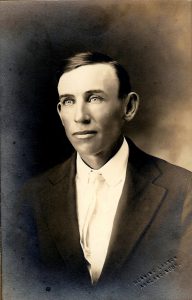 railroads doubled and redoubled again from 20 million tons in 1881 to 130 million in 1904.[178]
railroads doubled and redoubled again from 20 million tons in 1881 to 130 million in 1904.[178]
Despite the growth brought by the railroads and new techniques, Missouri continued to undergo urbanization during the late 19th century. Labor-saving devices such as the sulky plow, corn planter, mower, and reaper made most farm laborers more productive, with a surplus moving to town. In addition, the competition brought by the railroad generally caused a decline in farm prices after 1873; in 1874, a bushel of Missouri corn sold for 67 cents, but its price dropped to 24 cents in 1875 and remained in the 20 to 40 cent range for most of the 1870s and 1880s. As a result, although the acreage of Missouri farmland had increased from 1870 to 1880, the value of crops produced saw a decline from $103 million to slightly less than $96 million in the same period.[193]
A FARMER WAS BORN

29 Dec 1882
Rockport, Missouri
It was during this time that my grandfather, Venus Vern Pierce was born on a farm south of Rockport, Missouri, to John Franklin Pierce and Alice Roena (Johnson) Pierce. He was the third son and the fifth 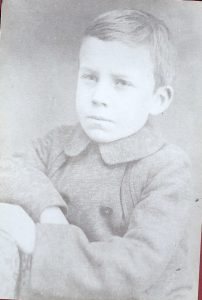 child of eight being born December 29, 1882.
child of eight being born December 29, 1882.
Of his schooling and early days I know very little but can only assume that he grew up learning hard work and little play and I believe that schooling was a part of his upbringing, as it appears from what I have learned that even through the hard times his parents flourished and prospered. His father, a pioneer having reclaimed from wilderness by his own hands hewed, and broke and planted to crops much of the fertile soil that he owned. They lived on a spacious farm and had all the conveniences and advantages that his parents could procure for the happiness of their family.
In response to declining prices and opportunities for new scientific methods farmers began forming chapters of The Grange. Oliver Hudson, a U.S. Bureau of Agriculture employee, formed the first Missouri Grange chapter in 1870, and by 1875, Missouri led the nation with over 2,000 chapters. In addition to organizing social events for farmers and their wives, the Grange organized them economically by creating trade fairs and collective sales of farm produce, and the group opened no fewer than eight cooperative stores where goods could be bought at reasonable prices by Grange members. Grange stores operated in several market towns[194]
After significant declines during the 1880s, land prices recovered slightly during the 1890s, although the market remained unstable and largely dependent on the particulars of the farm.
The late 19th century was a time of continuity in terms of crops produced in Missouri, with the majority of acreage given to the production of corn and wheat. In 1900, farmers devoted more than 7.5 million acres (of nearly 23 million total) to corn, although yields declined overall as less productive and fertile land was brought into use. Most corn in Missouri also was consumed in the state by livestock, and hay and pasture land for livestock made up 10.5 million acres of farmland in 1900. Livestock income provided 55% of farm income in 1900, or roughly $142 million.[196]
 The 1900 Census shows Venus still living at home with his parents, but soon after he set out on his own.My grandmother revealed to me that that Venus was young when he started farming, and that he borrowed money and bought a pair of mules and a few pieces of walking machinery. I am assuming that this would be his move to Nebraska. She told that he bought a farm and worked diligently hard to keep it. One night he came home from town and found the farm on fire. He lost everything he had.
The 1900 Census shows Venus still living at home with his parents, but soon after he set out on his own.My grandmother revealed to me that that Venus was young when he started farming, and that he borrowed money and bought a pair of mules and a few pieces of walking machinery. I am assuming that this would be his move to Nebraska. She told that he bought a farm and worked diligently hard to keep it. One night he came home from town and found the farm on fire. He lost everything he had.
In 1908 he is found living in Antelope, Nebraska, apparently having gone there with his sister Lottie, who met her husband in Brunswick and later married him in Valentine, Nebraska. I almost fell off of my chair when I learned that here at the age of 24 he married a Miss Lucy Grubbs 18, at Plainview. This marriage was a complete surprise to the family as no one had ever spoken of it. After some research I found that Lucy had been married several times after this but do not know of what the reason for the split was and have not found anything about divorce.
The 1910 Census shows that Venus was again at home in Missouri but nothing is listed as to his occupation. A newspaper article found from June 10, 1910 reveals that he was a pioneer homesteader in the Valentine, Nebraska area as was his sister Geneva and her husband, and his sister Lottie was also living there. Venus’ father died in August of that year and his mother died the next year.
 He went to Pittsburgh, Pennsylvania, where he got a job at the Pittsburgh Glass Co. as a superintendent over a large group of men. He worked hard here for several years. I am going to guess that his older brother Lonnie played a role in helping him attain work here as Lonnie lived and worked at a Glass Company in Pennsylvania for most of his working years.
He went to Pittsburgh, Pennsylvania, where he got a job at the Pittsburgh Glass Co. as a superintendent over a large group of men. He worked hard here for several years. I am going to guess that his older brother Lonnie played a role in helping him attain work here as Lonnie lived and worked at a Glass Company in Pennsylvania for most of his working years.
In 1912 Venus inherited 2,500 dollars from his parents after they passed away. With this money he moved to Ashland, Nebraska and bought a farm with 80 acres of land, south east of Ashland. He also bought his machinery and stock with this money. Just down the road lived the Blum family. They often times held dances at their place in which Venus would attend. He became particularly interested in Louise Blum but she would have nothing to do with him and he turned his attention to her sister Marie. Venus and Miss Anna Mariea Blum were married September 22, 1915 in a quiet ceremony at the home of the German Evangelical minister in Ashland and set up housekeeping at the home Venus had prepared.
In 1917, Venus sold his land in Ashland and moved to a Crab Orchard, Nebraska where the couple welcomed their

first born, Venus John (Johnny) on February 22, 1918. He bought and sold land many times was a good business man and generally made a fair profit. Grandmother Marie said she moved 22 times during her marriage and all to places of ill repair, and almost always by wagon or hay rack. As soon as she would get the place in livable condition, Venus would sell and they would move again. The couple had a second son born April 26, 1921 at their home in Liberty, and was named Clifford Wayne.
Much was happening in the United States in the 20’s. With the advancement of technology, travel in the way of vehicles and air flight, electricity, telephones and radios being installed in most homes, life only could appear to be better than what it had been in the past. Also came prohibition that opened up speak easies and gave way to gangsters. Free movies on the city and town streets for all to watch. More roads were being opened up to make travel much easier. The invention of penicillin. Things were looking good for the Pierce’s.
In January 1928, the 24th day Venus and Marie welcomed their third son, Cecil Pierce. He was born in Beatrice, Nebraska, the first of the children to be born in a hospital. Then in 1929 the crash of Wall street started the beginning of the great depression in the Midwest. Venus’ brother Reno, was out of a job that year and he and his wife and two children came to stay with them as Marie felt she could use the extra help with a new baby coming in December. They had a pig they butchered, the potatoes were only small from the garden so they cooked them with the jackets on. Johnny and Cliff, along with Reno’s daughters, Thelma and Gene, took bean sandwiches to school for lunch.
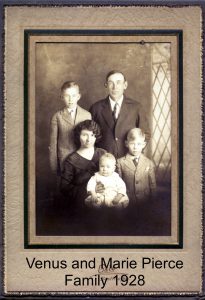
On Christmas day 1929 Venus and Marie sent Johnny and Cliff out to go hunting with the neighbor kids. They got cold and started a fire to keep warm and ended up burning a pasture so all of the neighbors were called out to put the fire out.
When Johnny and Cliff got back to the house they found they had a baby sister.
Their only daughter and the last of the children was named Juanita Marie…though she was always called Carol. Christmas Carol.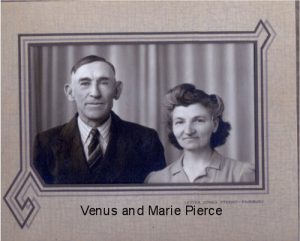
Venus was basically a happy man, hard working, and well respected. He was known to joke and tease, yet he was a worrier, a trait that was passed down to his son Cecil and on to some Cecil’s children. (again I wonder, dna or upbringing) He was a good business man and was great with figures. He could figure a long list of numbers in his head and was always figuring something. His hand were rough and calloused with nicks and cuts for all his hard work. He and Marie would cut wood with a cross saw and sell big wagon loads of it for 2 dollars a load. He would deliver the wood in the winter when it was so cold that he would walk next to the horses in order to keep warm. He started out early in the mornings to plow the fields. Before he left he would carry in buckets of water for Marie so that she would have enough for the babies while he was gone. Marie would take him a fresh team of horses in the middle of the morning. Carol remembers sitting in the corner of the wagon while he and Marie, and the boys would pick corn. They all worked very hard to keep the farm going. .
would pick corn. They all worked very hard to keep the farm going. .
Carol remembers cutting cockle burrs with her brother Cec and her dad, one row at a time. Venus would tell them, “We are getting them.” and encourage them to keep going. They were hot and thirsty and not very happy with the project.
Venus was not a drinker according to his daughter Carol. He just didn’t handle it well. She remembers one time that he had a bit too much to drink and he was outside in the yard getting sick and Marie took a bucket of water out and poured it on his head. She didn’t like it when he drank, as her father was a bit of a lush and she had grown up with the effects.
Johnny left home at quite a young age and went to live for a time with Marie’s brother Bill. No one really knows the reason why though I’ve asked a few times.
When Cliff was 12 he won a pony race at celebration in Reynolds and was noticed by a couple from California. They convinced Venus to let Cliff go with them to California and contracted him as a jockey in San Diego. Mrs. Presnell promised Marie that she would look after him and care for him as her own. Venus and Marie followed closely the
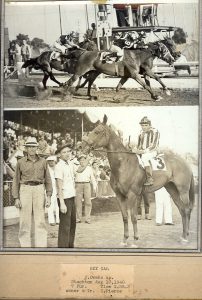
career of their son as he was soon recognized as an up and coming jockey.
WWII took both of the older boys off to war and Cecil and Carol were left at home to help with the farm work.
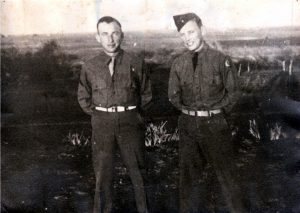
Early one morning at breakfast, they sit down at the table for their morning meal of pancakes. Venus dropped his fork and his eyes became fixed in an empty stare. He had begun the process of getting the rest of his teeth pulled, when he had this first stroke. Marie took great care of him as he couldn’t talk. For a couple of days he kept trying to ask them something, Finally they figured out he was wondering if their home in Belvedere, Nebraska was 2 or 3 lots. Carol remembers shaving him after they would get him up and get him in a chair. Cecil would only say that it was terrible. Marie would wash the linens everyday and hang them out to dry. His second stroke came three months later, and he slept in a coma for a day and a night. He died at home Jun. 6, 1948, in Reynolds, Jefferson County, Nebraska. age 64 years and 6 months. At the time of his death he owned 400 acres, a store, and a restaurant.
Johnny didn’t want Venus to be buried in the Reynolds cemetery as it was always grown up with weeds and Venus had fought weeds on his farms all of his years, so plans were made for burial in Fairbury, Nebraska.

At the time of his death Venus John and Clifford were married. John was married to Dean Zierenburg and Clifford married to Barbara Dowe.
One year after his death his daughter Carol married Paul McKenzie and 3 years after his death his son Cecil married Peggy Nutsch. Venus left his land to his three sons and his daughter and the store and restaurant to Clifford, which was destroyed a year later in 1949 by a tornado.
Marie was a young widow. She lived for a time with Johnny and Dean until she moved to Omaha and lived with her brother Martin for several years. After Martin remarried, Marie moved to a trailer in Murdock, Nebraska across the street from her brother Bill. When she no longer felt she could live on her own she moved to a senior living community in Omaha until the time of her death in 1984.
As always thank you for visiting. I hope you enjoyed the story of Venus. If you are someone that has anything to add to this story please leave me a message in the comment section as not only would I love to hear it, I’d love to add it!
Happy Hunting
The Pierce Family Historian
Susan Pierce Holmes
